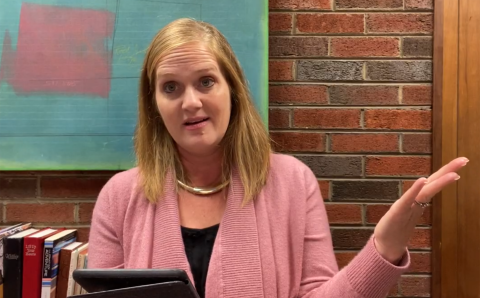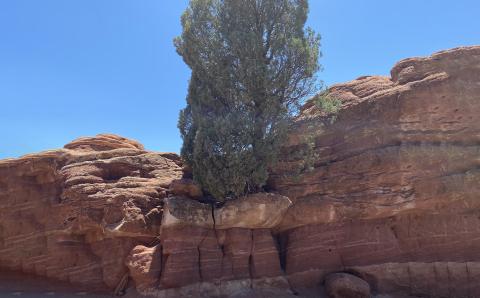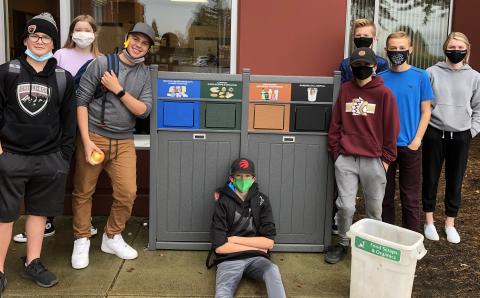After creating Adam, God placed him in a garden. The garden would feed Adam, and in return Adam was to take care of it (Gen. 2:15). How are we taking care of the places where we live?
In our interconnected world, actions we take now affect not only our own backyards, farms, and cities, but also distant places and peoples extending centuries into the future. An important example of this interconnectedness is greenhouse gases, which are like a global thermostat, trapping heat in the atmosphere. Greenhouse gases emitted anywhere travel around the world within weeks and might remain in the air for many decades, increasingly affecting everyone.
We’re starting to see damaging effects from increasing greenhouse gas concentrations—increasingly severe heat waves, storms, floods, and wildfires. Almost two-thirds of Americans now agree that climate change is either a crisis or a serious problem, with a majority wanting immediate action. Yet many others, inside and outside the church, deny the urgency of this problem. They wonder: given the huge temperature swings from summer to winter, day to night, do a few degrees really matter? They ask: would a good God allow a global climate catastrophe to unfold?
These are fair questions. But they have answers.
Do a few degrees of warming really matter?
Let’s address this question with relevant information from climate.nasa.gov. According to ice core data, in the 12,000 years since the last ice age, the earth’s average temperature has changed only slightly from century to century. In the past 50 years, however, temperatures have increased by 1 degree Celsius (1.8 degrees Fahrenheit), and at a rate at least 10 times faster than after any earlier glacial period. It is no coincidence that temperatures are increasing at the same time as greenhouse gas levels. Scientists have calculated that the odds of “natural variability” being the major cause of our rising temperatures are now less than one in 20. Living by this assumption is clearly a foolish gamble.
There are two things to keep in mind about the temperature change we’ve seen so far: its unevenness and its speed. While a change of 1 degree Celsius sounds almost imperceptible, this is a global average. Almost all land areas have warmed more than this, and temperatures have been increasing dramatically nearer the poles. Some areas of the Arctic have already warmed by 15 degrees Fahrenheit (National Geographic, Nov. 2015, p.16). A Dartmouth expert on ice melt has described Greenland’s current melting rate as a herd of 2,000 elephants entering the ocean every second. Multiple scientific studies predict that if global average temperatures increase by another degree or two, the melting of Greenland’s ice sheet will become unstoppable, sending us down a path where sea level will rise by 23 feet over the next few centuries. We might already be halfway down the road to causing this slow-motion disaster.
The speed of change also matters. In a warming climate, plants and animals migrate toward the poles or to higher altitudes to stay at similar temperatures. Entire ecosystems must travel together to survive, so the speed at which successful migration can occur is quite slow. As reported by Elizabeth Kolbert in The Sixth Extinction, if our rapid rise in temperature continues for another few degrees, a mass extinction is likely. Up to one-third of God’s species might be gone, including many associated with mountaintops (redwoods, pikas), polar regions (polar bears, ringed seals, penguins), and coral reefs. All of us who worship God as creator should work together to prevent such a loss.
Would God allow this to happen?
God is good, all the time. Would God allow our coastal cities to be lost to the ocean, or so many of his creatures to vanish? We can all affirm that God is active in restraining evil as he works out his purposes of salvation. A normative way that God restrains evil, however, is by allowing us to experience the damage and brokenness caused by our actions so that we will turn to him in repentance. Jesus’ parable of the prodigal son illustrates this. The son’s dissolute lifestyle and rejection of his father landed him in dire poverty. If his father or anyone else had shielded him from the consequences of his actions, the son would not have been driven by hunger to return home, and he would never have experienced the intensity of his father’s love expressed in the joyous welcome and restoration the son received upon arrival.
But isn’t God in charge of climate? Indeed he is, but he loves humankind so much that when we mess up, he sends us wake-up calls and makes us deal with the consequences. Great parenting! In the 1980s, the protective ozone layer was depleted by refrigerant chemicals, and we had to fix it. Now the U.S., with 5% of the world’s population, is using 25% of its resources. By unnecessarily adding greenhouse gases to the atmosphere, we are disregarding the survival of other species and the welfare of future generations. This is evil, another aspect of our damaging fallenness. Our climate is breaking down, and we are the cause. How will we respond?
The church should know the correct way to respond. Let others try to shift blame, justify inaction, or jockey for advantage in the chaos. We know that even though God is in control, he prefers to work through his people. We therefore must abandon all our sinful ways and, like the prodigal son, decide to return home. This is the only road to renewal and restoration. We pray:
Father, thank you for our exquisitely beautiful home, its amazing diversity of plants and animals, and your provision for every living thing. We confess that we have not taken adequate care of your creation. We have lived large instead of simply, used far more than was necessary, and have sought luxury instead of you. You’ve called us to care for “the least,” as you do, but instead we have placed our wants front and center and left little for the poor or for future generations to work with. Father, forgive us! Help us to reorder our lives, reflecting your love and care for others and for all parts of your good creation. Through the Holy Spirit, heal us and our land. In Jesus’ name, amen.
The prodigal son didn’t make it all the way home before his joyful father ran out to meet him. God can use our small steps toward faithful living to accomplish something big—in our hearts, in our churches, and in our world.
What would reordered lives look like?
You will need to envision this for yourself, guided by the Spirit. Here’s what we envision:
- Practice the spiritual disciplines of simplicity and generosity.
- Focus on relationships rather than possessions.
- Support leaders who will courageously address climate change.
- Rapidly reduce our carbon footprint—the total amount of greenhouse gases emitted by our activities and our purchases—by enacting many small and large changes in how we live, work, and travel.
- Downsize, consume less, waste less, and love more.
Resources on Climate Change
- CRC Creation Stewardship Task Force report, 2012 Agenda for Synod, Appendix C, crcna.org/sites/default/files/2012_agenda.pdf.
- Piers, Ken. “Sustainability and the Environment.” In Delight in Creation: Scientists Share Their Work with the Church, edited by Deborah Haarsma and Scott Hoezee, Ch. 7. Grand Rapids, Mich.: Center for Excellence in Preaching, Calvin Theological Seminary, 2012.
- NOVA. “Polar Extremes,” NOVA website, pbs.org/wgbh/nova/video/polar-extremes, accessed March 2021.
- How We Lost the Planet“ and “How We Saved the World,” National Geographic, April 2020 double issue. Most issues since 2015 cover climate change.
- Magazines published by the Sierra Club, The Nature Conservancy, and The National Wildlife Federation often suggest practical ways to limit our carbon footprint.
About the Authors
Frank De Haan is a retired chemistry professor and an active member at Bethel Christian Reformed Church in Sun Valley, Calif.
David De Haan, serves as professor of chemistry and biochemistry at the University of San Diego and as a volunteer musician at Redemption Church in Scripps Ranch, Calif. The two recently authored Reading Genesis and Modern Science: A Study Guide, which includes a chapter on global climate change.








